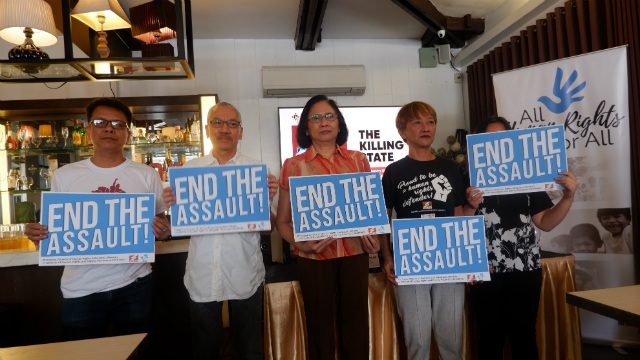SUMMARY
This is AI generated summarization, which may have errors. For context, always refer to the full article.

MANILA, Philippines – The lack of transparency under the Duterte administration remains a hindrance in the quest for justice by victims of the violent anti-illegal drugs campaign.
The struggle comes as the situation in the country continues to be a “hostile environment for ordinary Filipinos,” according to a report by the Philippine Human Rights Information Center (PhilRights) released on Wednesday, February 5.
PhilRights executive director Nymia Simbulan said that this and President Rodrigo Duterte’s “full-scale” assault on human rights are his real legacies, and not the numbers presented by the Duterte Cabinet. (READ: Making sense of the ‘Duterte Legacy’ infographic)
“Transparency and honesty are not government priority,” she said. “Isang glaring characteristic ng gobyerno na ito, na mapapailing ka na lang, talagang lahat ng kasinungalingan, lahat ng fake news, nagagawa nilang katotohanan.”
(One glaring characteristic of this government, that you can’t help but just shake your head, is its lies, all the fake news, they can distort the truth.)
Duterte’s war on drugs has been widely criticized for its high number of deaths. Data shows that more than 6,000 suspected drug personalities were killed in police operations alone, while human rights groups estimate the number to reach almost 27,000 to include those killed vigilante-style. (READ: The Impunity Series)
Still no accountability
The Duterte government has often resorted to threats and attacks to counter criticism from both local and international groups, to the extent of withdrawing from the International Criminal Court (ICC).
According to Simbulan, the crux now is the accountability and obligation of the state in the drug war which still cannot be felt more than 3 years into the administration.
“The lack of recognition of the state of its accountability for those tortured, detained, and killed is a reflection of how the government values and looks at human rights and human lives,” she said.
Beyond threats from the President himself, families of victims of extrajudicial killings bear the brunt of the apparent lack of access to avenues for justice.
According to PhilRights, many families have a hard time requesting legal documents like spot reports, if ever they want to file a case against perpetrators.
“Paraan nila iyon para ma-discourage ang mga families who would like to seek justice,” she said. “Iyong pinapabalik-balik sila hanggang finally ma-realize ng pamilya na talagang walang pag-asa na makakuha ng police report or any official document.”
(That’s their way to discourage families who would like to seek justice. The fact that they ask them to go back another day until the family realizes that there’s really no chance they’ll get the police report or any official document.)
The Duterte administration has submitted to the Supreme Court documents related to the anti-illegal drug campaign.
The documents, which came from the Philippine National Police, are vital to the assessment conducted by the High Court regarding the drug war’s constitutionality or legality. (READ: How Duterte gov’t tried to fix legal loopholes of drug war)
The Free Legal Assistance Group (FLAG) in October 2019 said the police records showed that cops kill suspects outright, but noted that “many of the files contained in the compact discs as well as some of the hard copies furnished to petitioners are corrupted or could not be read.”
Simbulan of PhilRights said that this should not be the case in future efforts to call for accountability.
“That is definitely something that we really have to fight it out, we have to protest, regardless of the risk and difficulties that we have to face,” she said.
Rose Trajano, secretary-general of the Philippine Alliance of Human Rights Advocates (PAHRA), remains optimistic that justice will be served once Duterte leaves office.
“Hanggang sa panahon ni Duterte, wala tayong mae-expect na improvement sa transparency,” she said. “Pero hindi naman lahat ng panahon ay siya ang Presidente kasi sabi nga, may araw din siya.”
(Until we’re under the Duterte administration, we can’t expect any improvement in transparency. But he will not be President forever. Like what they say, he’ll have this time.) – Rappler.com
Add a comment
How does this make you feel?
There are no comments yet. Add your comment to start the conversation.